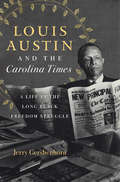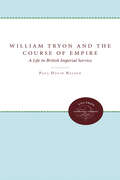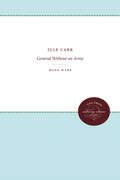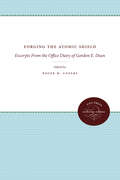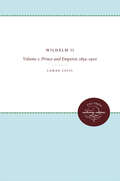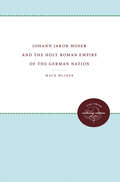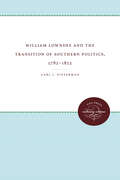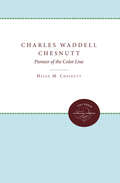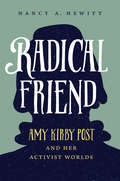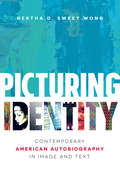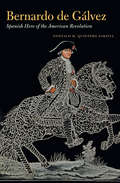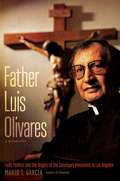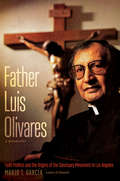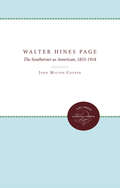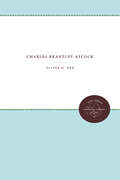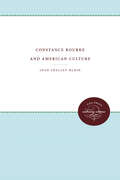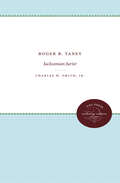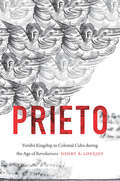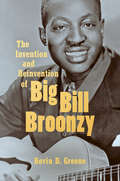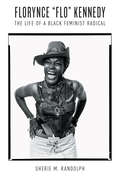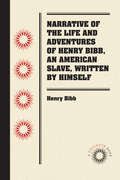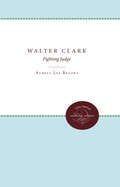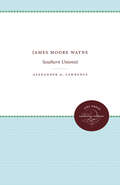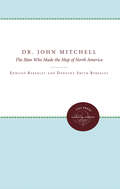- Table View
- List View
Louis Austin and the Carolina Times: A Life in the Long Black Freedom Struggle
by Jerry GershenhornLouis Austin (1898–1971) came of age at the nadir of the Jim Crow era and became a transformative leader of the long black freedom struggle in North Carolina. From 1927 to 1971, he published and edited the Carolina Times, the preeminent black newspaper in the state. He used the power of the press to voice the anger of black Carolinians, and to turn that anger into action in a forty-year crusade for freedom.In this biography, Jerry Gershenhorn chronicles Austin's career as a journalist and activist, highlighting his work during the Great Depression, World War II, and the postwar civil rights movement. Austin helped pioneer radical tactics during the Depression, including antisegregation lawsuits, boycotts of segregated movie theaters and white-owned stores that refused to hire black workers, and African American voting rights campaigns based on political participation in the Democratic Party. In examining Austin's life, Gershenhorn narrates the story of the long black freedom struggle in North Carolina from a new vantage point, shedding new light on the vitality of black protest and the black press in the twentieth century.
Serpent in Eden: H. L. Mencken and the South
by Fred C. HobsonThe appearance in 1920 of H. L. Mencken's scathing essay about the intellectual and cultural impoverishment of the South, "The Sahara of the Bozart", set off a firestorm of reaction in the region that continued unabated for much of the next decade. In Serpent in Eden, Mencken scholar Fred Hobson examines Mencken's love-hate relationship with the South. He explores not only Mencken's savage criticism of the region but also his efforts to encourage southern writers and the bold "little magazines", such as the Reviewer and the Double Dealer, that started up in the South during the 1920s.Originally published in 1974.A UNC Press Enduring Edition -- UNC Press Enduring Editions use the latest in digital technology to make available again books from our distinguished backlist that were previously out of print. These editions are published unaltered from the original, and are presented in affordable paperback formats, bringing readers both historical and cultural value.
William Tryon and the Course of Empire: A Life in British Imperial Service
by Paul David NelsonWilliam Tryon's role in the affairs of British America during the last years of the empire, and his inability to stem the collapse of that empire, makes for a fascinating story. Royal governor of North Carolina from 1765 to 1771 and then of New York from 1771 to 1780, Tryon became a general in the British army attempting to quell the American rebellion. This biography covers his life in service to the Crown through the end of the American Revolution.Paul Nelson argues that Tryon was a talented colonial administrator and a successful, even popular, governor largely because he understood American thinking on such basic constitutional issues as taxation, finance, and trade policy. British home authorities failed to follow Tryon's sage counsel regarding the governance of the colonies, advice that might have forestalled the Revolution. In particular, Tryon, like Edmund Burke and others in Parliament, could not convince British ministers that Americans would never accept internal taxes imposed upon them by London.Once the war broke out and Tryon's role changed from governing to leading Loyalist American troops, he was an advocate of harsh, retributive warfare against his former charges. Nelson follows Tryon's military career, especially his debates with colleagues such as Sir Henry Clinton on the wisdom of hard-line versus conciliatory approach to the fighting. And after the war, Nelson shows, Tryon's connections with those unfortunate Americans who came out on the losing side of the great imperial struggle retained an important place in his life. An exciting drama in its own right, Tryon's story also serves to illuminate a number of issues important to historians of the Revolutionary War. Played out on two continents and in two important American colonies, amid the stirring events that resulted in the formation of the United States of America, Tryon's life is significant for understanding many aspects of politics and society in the Anglo-American world of the eighteenth century.Originally published in 1990.A UNC Press Enduring Edition -- UNC Press Enduring Editions use the latest in digital technology to make available again books from our distinguished backlist that were previously out of print. These editions are published unaltered from the original, and are presented in affordable paperback formats, bringing readers both historical and cultural value.
Jule Carr: General Without an Army
by Mena WebbA UNC Press Enduring Edition -- UNC Press Enduring Editions use the latest in digital technology to make available again books from our distinguished backlist that were previously out of print. These editions are published unaltered from the original, and are presented in affordable paperback formats, bringing readers both historical and cultural value.
Forging the Atomic Shield: Excerpts From the Office Diary of Gordon E. Dean
by Roger M. AndersSoon after his appointment as chairman of the U.S. Atomic Energy Commission in 1950, Gordon E. Dean began an office diary composed primarily of notes from his telephone conversations. The diary contains Dean's accounts of the mobilization of atomic energy for the Korean War, the decision to conduct atmospheric nuclear weapons tests in the U.S., the development and testing of the first thermonuclear device, the decisions to erect vast plants for the production of atomic weapons, the Rosenberg atom spy case, and other critical issues.Originally published in 1987. A UNC Press Enduring Edition -- UNC Press Enduring Editions use the latest in digital technology to make available again books from our distinguished backlist that were previously out of print. These editions are published unaltered from the original, and are presented in affordable paperback formats, bringing readers both historical and cultural value.
Wilhelm II: Volume 1: Prince and Emperor, 1859-1900 (H. Eugene and Lillian Youngs Lehman Series #1)
by Lamar CecilWilhelm II (1859-1941), King of Prussia and German Emperor from 1888 to 1918, reigned during a period of unprecedented economic, cultural, and intellectual achievement in Germany. Unlike most European sovereigns of his generation, Wilhelm was no mere figurehead, and his imprint on imperial Germany was profound. In this book and a second volume, historian Lamar Cecil provides the first comprehensive biography of one of modern history's most powerful--and most misunderstood--rulers. Wilhelm II: Prince and Emperor, 1859-1900 concentrates on Wilhelm's youth. As Cecil shows, the future ruler's Anglo-German genealogy, his education, and his subsequent service as an officer in the Prussian army proved to be unfortunate legacies in shaping Wilhelm's behavior and ideas. Throughout his thirty-year reign, Wilhelm's connection with his subjects was tenuous. He surrounded himself with a small coterie of persons drawn from the government, the military, and elite society, most of whom were valued not for their ability but for their loyalty to the crown. They, in turn, contrived to keep Wilhelm isolated from outside influences, learned to be accomplished in catering to his prejudices, and strengthened his conviction that the government should be composed only of those who agreed with him. The day-to-day conduct of Germany's affairs was left in the hands of these loyal followers, for the Kaiser himself did not at all enjoy work. Rejoicing instead in pageantry and the superficial trappings of authority, he was particular about what he did and what he read, eliminating anything that was unpleasant, difficult, or tedious. He never learned to listen, to reason, or to make decisions in a sound, informed manner; he was customarily inclined to act solely on the basis of his personal feelings.Many people believed him to be mad. Even courtiers who admired Wilhelm recognized that he was responsible for the diplomatic embarrassment in which Germany found itself by 1914 and that the Kaiser's maladroit behavior endangered the prestige of the Hohenzollern crown. His is the story of a bizarre and incapable sovereign who never doubted that he possessed both genius and divine inspiration.Originally published in 1989.A UNC Press Enduring Edition -- UNC Press Enduring Editions use the latest in digital technology to make available again books from our distinguished backlist that were previously out of print. These editions are published unaltered from the original, and are presented in affordable paperback formats, bringing readers both historical and cultural value.
Johann Jakob Moser and the Holy Roman Empire of the German Nation
by Mack WalkerAs the most learned and eminent public lawyer in Germany, a busy administrator, and a prolific writer, Moser (1701-85) lived and breathed the political order. His correspondence, memoranda, and manuscript autobiography reflect the intricate day-to-day operations of the empire, and his fascinating life is a microcosm of the life and style of the empire itself. The biography provided a comprehensive picture of the empire between the Thirty Years War and the revolutionary era.Originally published 1981.A UNC Press Enduring Edition -- UNC Press Enduring Editions use the latest in digital technology to make available again books from our distinguished backlist that were previously out of print. These editions are published unaltered from the original, and are presented in affordable paperback formats, bringing readers both historical and cultural value.
William Lowndes and the Transition of Southern Politics, 1782-1822
by Carl J. VippermanThis first scholarly biography of Lowndes establishes his place in history, even though he was overshadowed by contemporaries John C. Calhoun and Henry Clay, and provides valuable insights into our understanding of the development and decline of republicanism. Lowndes served in Congress during a time when the rising spirit of democracy challenged the elitist character of republicanism and advanced majority rule, thus raising questions concerning the nature of the Union.Originally published in 1989.A UNC Press Enduring Edition -- UNC Press Enduring Editions use the latest in digital technology to make available again books from our distinguished backlist that were previously out of print. These editions are published unaltered from the original, and are presented in affordable paperback formats, bringing readers both historical and cultural value.
Charles Waddell Chesnutt: Pioneer of the Color Line
by Helen M. ChesnuttThe driving force in Chesnutt's life was the wish to help his race. Long before the days of the NAACP, which he later joined, and to the end of his life, he lectured, wrote,and corresponded on the everlasting problem." His letters reveal courage and good sense with which he faced racial discrimination."Originally published in 1952.A UNC Press Enduring Edition -- UNC Press Enduring Editions use the latest in digital technology to make available again books from our distinguished backlist that were previously out of print. These editions are published unaltered from the original, and are presented in affordable paperback formats, bringing readers both historical and cultural value.
Radical Friend: Amy Kirby Post and Her Activist Worlds
by Nancy A. HewittA pillar of radical activism in nineteenth-century America, Amy Kirby Post (1802@–89) participated in a wide range of movements and labored tirelessly to orchestrate ties between issues, causes, and activists. A conductor on the Underground Railroad, co-organizer of the 1848 Rochester Woman's Rights Convention, and a key figure in progressive Quaker, antislavery, feminist, and spiritualist communities, Post sustained movements locally, regionally, and nationally over many decades. But more than simply telling the story of her role as a local leader or a bridge between local and national arenas of activism, Nancy A. Hewitt argues that Post's radical vision offers a critical perspective on current conceptualizations of social activism in the nineteenth century.While some individual radicals in this period have received contemporary attention—most notably William Lloyd Garrison, Frederick Douglass, and Lucretia Mott (all of whom were friends of Post)—the existence of an extensive network of radical activists bound together across eight decades by ties of family, friendship, and faith has been largely ignored. In this in-depth biography of Post, Hewitt demonstrates a vibrant radical tradition of social justice that sought to transform the nation.
Picturing Identity: Contemporary American Autobiography in Image and Text
by Hertha D. WongIn this book, Hertha D. Sweet Wong examines the intersection of writing and visual art in the autobiographical work of twentieth- and twenty-first-century American writers and artists who employ a mix of written and visual forms of self-narration. Combining approaches from autobiography studies and visual studies, Wong argues that, in grappling with the breakdown of stable definitions of identity and unmediated representation, these writers-artists experiment with hybrid autobiography in image and text to break free of inherited visual-verbal regimes and revise painful histories. These works provide an interart focus for examining the possibilities of self-representation and self-narration, the boundaries of life writing, and the relationship between image and text. Wong considers eight writers-artists, including comic-book author Art Spiegelman; Faith Ringgold, known for her story quilts; and celebrated Indigenous writer Leslie Marmon Silko. Wong shows how her subjects formulate webs of intersubjectivity shaped by historical trauma, geography, race, and gender as they envision new possibilities of selfhood and fresh modes of self-narration in word and image.
Bernardo de Gálvez: Spanish Hero of the American Revolution
by Gonzalo M. Quintero SaraviaAlthough Spain was never a formal ally of the United States during the American Revolution, its entry into the war definitively tipped the balance against Britain. Led by Bernardo de Galvez, supreme commander of the Spanish forces in North America, their military campaigns against British settlements on the Mississippi River—and later against Mobile and Pensacola—were crucial in preventing Britain from concentrating all its North American military and naval forces on the fight against George Washington's Continental army. In this first comprehensive biography of Galvez (1746@–86), Gonzalo M. Quintero Saravia assesses the commander's considerable historical impact and expands our understanding of Spain's contribution to the war.A man of both empire and the Enlightenment, as viceroy of New Spain (1785@–86), Galvez was also pivotal in the design and implementation of Spanish colonial reforms, which included the reorganization of Spain's Northern Frontier that brought peace to the region for the duration of the Spanish presence in North America. Extensively researched through Spanish, Mexican, and U.S. archives, Quintero Saravia's portrait of Galvez reveals him as central to the histories of the Revolution and late eighteenth-century America and offers a reinterpretation of the international factors involved in the American War for Independence.
Father Luis Olivares, A Biography: Faith Politics And The Origins Of The Sanctuary Movement In Los Angeles
by Mario T. GarcíaThis is the amazing untold story of the Los Angeles sanctuary movement's champion, Father Luis Olivares (1934-1993), a Catholic priest and a charismatic, faith-driven leader for social justice. Beginning in 1980 and continuing for most of the decade, hundreds of thousands of Salvadoran and Guatemalan refugees made the hazardous journey to the United States, seeking asylum from political repression and violence in their home states. Instead of being welcomed by the "country of immigrants," they were rebuffed by the Reagan administration, which supported the governments from which they fled. To counter this policy, a powerful sanctuary movement rose up to provide safe havens in churches and synagogues for thousands of Central American refugees. Based on previously unexplored archives and over ninety oral histories, this compelling biography traces the life of a complex and constantly evolving individual, from Olivares's humble beginnings in San Antonio, Texas, to his close friendship with legendary civil rights leader Cesar Chavez and his historic leadership of the United Neighborhoods Organization and the sanctuary movement.
Father Luis Olivares, a Biography: Faith Politics and the Origins of the Sanctuary Movement in Los Angeles
by Mario T. GarcíaThis is the amazing untold story of the Los Angeles sanctuary movement's champion, Father Luis Olivares (1934–1993), a Catholic priest and a charismatic, faith-driven leader for social justice. Beginning in 1980 and continuing for most of the decade, hundreds of thousands of Salvadoran and Guatemalan refugees made the hazardous journey to the United States, seeking asylum from political repression and violence in their home states. Instead of being welcomed by the "country of immigrants," they were rebuffed by the Reagan administration, which supported the governments from which they fled. To counter this policy, a powerful sanctuary movement rose up to provide safe havens in churches and synagogues for thousands of Central American refugees.Based on previously unexplored archives and over ninety oral histories, this compelling biography traces the life of a complex and constantly evolving individual, from Olivares's humble beginnings in San Antonio, Texas, to his close friendship with legendary civil rights leader Cesar Chavez and his historic leadership of the United Neighborhoods Organization and the sanctuary movement.
Walter Hines Page: The Southerner As American, 1855-1918
by John Milton CooperThe varied career of Walter Hines Page affected many facets of the American political and social milieu from the end of Reconstruction through World War I. A North Carolinian, Page was one of the first southerners after Reconstruction to argue that sectional hostility was needless, and he constantly worked to restore national union and frequently acted as an interpreter for the North and the South. As a journalist, publisher, reformer, president-maker, and ambassador, he strove to assure both North and South that the southerner was basically an American, that southern problems were national ones, and that education and hard work could recreate the Union.As a young man, Page found the South too stifling to give scope to his ambitions. He left it for good at the age of twenty-nine to make a brilliant career as editor and book publisher in the North. He served as editor of Forum, Atlantic Monthly, and World's Work. Later he founded the publishing firm Doubleday, Page & Company. As a magazine editor he wrote about the problems of the South; as a book publisher he introduced many southern writers to the nation; as a member of several of the most powerful philanthropic boards he sought funds to improve education and public health in the South. As a result of his early support of Woodrow Wilson for the presidency, Page was appointed ambassador to the Court of St. James's from which he fervently advocated the Allied cause.Throughly researching both American and British government documents and private papers, and using interviews with Page's contemporaries, Cooper reinterprets and establishes the significance of Page's career.Originally published in 1977. A UNC Press Enduring Edition -- UNC Press Enduring Editions use the latest in digital technology to make available again books from our distinguished backlist that were previously out of print. These editions are published unaltered from the original, and are presented in affordable paperback formats, bringing readers both historical and cultural value.
Charles Brantley Aycock
by Oliver OrrOrr traces Aycock's growth from farm boy to practicing lawyer and on to that final eminence in which his fame spread beyond the state in connection with his brilliant oratory, his interest in public education, and his devotion to the Democratic party. His life became a legend long before he died, at the age of fifty-two, delivering an address titled Universal Education.Originally published in 1961.A UNC Press Enduring Edition -- UNC Press Enduring Editions use the latest in digital technology to make available again books from our distinguished backlist that were previously out of print. These editions are published unaltered from the original, and are presented in affordable paperback formats, bringing readers both historical and cultural value.
Constance Rourke and American Culture
by Joan Shelley RubinThe career of Constance Rourke (1885-1941) is one of the richest examples of the American writer's search for a "usable past." In this first full-length study of Rourke, Joan Shelley Rubin establishes the context for Rourke's defense of American culture -- the controversies that engaged her, the books that influenced her thinking, the premises that lay beneath her vocabulary. With the aid of Rourke's unpublished papers, the author explores her responses to issues that were compelling for her generation of intellectuals: the critique of America as materialistic and provincial; the demand for native traditions in the arts; the modern understanding of the nature of culture and myth; and the question of a critic's role in a democracy.Rourke's writings demonstrate that America did not suffer, as Van Wyck Brooks and others had maintained, from a damaging split between "high-brow" and "low-brow" but was rather a rich, unified culture in which the arts could thrive. Her classic American Humor (1931) and her biographies of Lotta Crabtree, Davy Crockett, Audubon, and Charles Sheeler celebrate the American as mythmaker. To foster what she called the "possession" of the national heritage, she used an evocative prose style accessible to a wide audience and depicted the frontier in more abstract terms than did other contempoaray scholars. Her commitment to social reform, acquired in her youth and strengthened at Vassar in the Progressive era, informed her sense of the function of criticism and guided her political activites in the 1930s.Drawing together Rourke's varied discussions of popular heroes, comic lore, literature, and art, Rubin illuminates the delicate balances and sometimes contradictory arguments underlying Rourke's description of America's cultural patterns. She also analyzes the way Rourke's encounters with the ideas of Van Wyck Brooks, Ruth Benedict, Jane Harrison, Bernard DeVoto, and Lewis Mumford shaped her view of America's achievements and possibilities. Rourke emerges not simply as a follower of Brooks or as a colleague of De Voto, nor even as an antiquarian or folklorist. Rather, she assumes her own unique and proper place -- as a pioneer who, more than anyone else of her day, boldly and eloquently showed Americans that they had the resources necessary for the future of both art and society. By placing Constance Rourke within the framework of a debate about the nature of American culture, the author makes a notable contribution to American intellectual history.Originally published in 1980.A UNC Press Enduring Edition -- UNC Press Enduring Editions use the latest in digital technology to make available again books from our distinguished backlist that were previously out of print. These editions are published unaltered from the original, and are presented in affordable paperback formats, bringing readers both historical and cultural value.
Roger B. Taney: Jacksonian Jurist
by Charles W. SmithSmith describes the political ideas of Chief Justice Taney and discusses his contributions to American constitutional law. Taney is revealed as a socially minded jurist who believed in the power of the whole people to regulate the affairs of life for the common good. As a political leader, Taney belongs in the democratic line that runs from Jefferson to Franklin D. Roosevelt; as a jurist he is a forerunner of Holmes and Brandeis. Originally published in 1936.A UNC Press Enduring Edition -- UNC Press Enduring Editions use the latest in digital technology to make available again books from our distinguished backlist that were previously out of print. These editions are published unaltered from the original, and are presented in affordable paperback formats, bringing readers both historical and cultural value.
Prieto: Yorùbá Kingship in Colonial Cuba during the Age of Revolutions (Envisioning Cuba)
by Henry B. LovejoyThis Atlantic world history centers on the life of Juan Nepomuceno Prieto (c. 1773–c. 1835), a member of the West African Yoruba people enslaved and taken to Havana during the era of the Atlantic slave trade. Richly situating Prieto's story within the context of colonial Cuba, Henry B. Lovejoy illuminates the vast process by which thousands of Yoruba speakers were forced into life-and-death struggles in a strange land. In Havana, Prieto and most of the people of the Yoruba diaspora were identified by the colonial authorities as Lucumi. Prieto's evolving identity becomes the fascinating fulcrum of the book. Drafted as an enslaved soldier for Spain, Prieto achieved self-manumission while still in the military. Rising steadily in his dangerous new world, he became the religious leader of Havana's most famous Lucumi cabildo, where he contributed to the development of the Afro-Cuban religion of Santeria. Then he was arrested on suspicion of fomenting slave rebellion. Trial testimony shows that he fell ill, but his ultimate fate is unknown. Despite the silences and contradictions that will never be fully resolved, Prieto's life opens a window onto how Africans creatively developed multiple forms of identity and resistance in Cuba and in the Atlantic world more broadly.
The Invention and Reinvention of Big Bill Broonzy
by Kevin D. GreeneOver the course of his long career, legendary bluesman William "Big Bill" Broonzy (1893–1958) helped shape the trajectory of the genre, from its roots in the rural Mississippi River Delta, through its rise as a popular genre in the North, to its eventual international acclaim. Along the way, Broonzy adopted an evolving personal and professional identity, tailoring his self-presentation to the demands of the place and time. His remarkable professional fluidity mirrored the range of expectations from his audiences, whose ideas about race, national belonging, identity, and the blues were refracted through Broonzy as if through a prism. Kevin D. Greene argues that Broonzy's popular success testifies to his ability to navigate the cultural expectations of his different audiences. However, this constant reinvention came at a personal and professional cost. Using Broonzy's multifaceted career, Greene situates blues performance at the center of understanding African American self-presentation and racial identity in the first half of the twentieth century. Through Broonzy's life and times, Greene assesses major themes and events in African American history, including the Great Migration, urbanization, and black expatriate encounters with European culture consumers. Drawing on a range of historical source materials as well as oral histories and personal archives held by Broonzy's son, Greene perceptively interrogates how notions of race, gender, and audience reception continue to shape concepts of folk culture and musical authenticity.
Florynce "Flo" Kennedy: The Life of a Black Feminist Radical (Gender and American Culture)
by Sherie M. RandolphOften photographed in a cowboy hat with her middle finger held defiantly in the air, Florynce "Flo" Kennedy (1916–2000) left a vibrant legacy as a leader of the Black Power and feminist movements. In the first biography of Kennedy, Sherie M. Randolph traces the life and political influence of this strikingly bold and controversial radical activist. Rather than simply reacting to the predominantly white feminist movement, Kennedy brought the lessons of Black Power to white feminism and built bridges in the struggles against racism and sexism. Randolph narrates Kennedy's progressive upbringing, her pathbreaking graduation from Columbia Law School, and her long career as a media-savvy activist, showing how Kennedy rose to founding roles in organizations such as the National Black Feminist Organization and the National Organization for Women, allying herself with both white and black activists such as Adam Clayton Powell, H. Rap Brown, Betty Friedan, and Shirley Chisholm.Making use of an extensive and previously uncollected archive, Randolph demonstrates profound connections within the histories of the new left, civil rights, Black Power, and feminism, showing that black feminism was pivotal in shaping postwar U.S. liberation movements.
Narrative of the Life and Adventures of Henry Bibb, An American Slave, Written by Himself
by Henry BibbHenry Bibb (1815-1854) was born to an enslaved woman named Mildred Jackson in Shelby County, Kentucky. His father was a state senator who never acknowledged him. His narrative documents his persistent attempts to escape to freedom, beginning at age ten, offering an insider's view of the degradation and varieties of slavery as well as its bitter legacies within families. Having finally settled in Detroit in 1842, Bibb joined the abolitionist lecture circuit and lived the rest of his days as a well-known African American activist who believed that Canada might offer a haven for the formerly enslaved.Bibb's autobiography, Narrative of the Life and Adventures of Henry Bibb, An American Slave, was published in 1849. Scholars have pointed out that Bibb's narrative has several distinguishing features among the larger body of slave narratives. Unusually, Bibb survived enslavement in the Deep South and later described it, and his narrative offers documentation of African folkways including conjuring and an account of Native American slaveholding practices as well. Henry Bibb was above all resilient and determined to achieve freedom for himself and others. Unwilling to abandon those he loved, he risked recapture several times to free them from enslavement, too. In the small span of his thirty-nine years he would live to be reunited with three of his brothers who had fled to Canada.A DOCSOUTH BOOK. This collaboration between UNC Press and the University of North Carolina at Chapel Hill Library brings classic works from the digital library of Documenting the American South back into print. DocSouth Books uses the latest digital technologies to make these works available in paperback and e-book formats. Each book contains a short summary and is otherwise unaltered from the original publication. DocSouth Books provide affordable and easily accessible editions to a new generation of scholars, students, and general readers.
Walter Clark: Fighting Judge
by Aubrey Lee BrooksIn this life of Walter Clark, the author tells of an antebellum boyhood on a Carolina plantation and a long career of involvement in the bitterest sociopolitical battles the state of North Carolina has known, which won Clark a national reputation as a liberal noted for his straight thinking and his clear speaking.Originally published in 1947.A UNC Press Enduring Edition -- UNC Press Enduring Editions use the latest in digital technology to make available again books from our distinguished backlist that were previously out of print. These editions are published unaltered from the original, and are presented in affordable paperback formats, bringing readers both historical and cultural value.
James Moore Wayne: Southern Unionist
by Alexander A. LawrenceSouthern aristocrat, mayor of Savannah, congressman for three terms, justice of the Supreme Court of the United States, James Moore Wayne made love of the federal union the governing principle of his political and judicial career. Here is shown the impact of this southern unionist upon the Supreme Court during the critical period from 1835 to 1867.Originally published in 1943.A UNC Press Enduring Edition -- UNC Press Enduring Editions use the latest in digital technology to make available again books from our distinguished backlist that were previously out of print. These editions are published unaltered from the original, and are presented in affordable paperback formats, bringing readers both historical and cultural value.
Dr. John Mitchell: The Man Who Made the Map of North America
by Edmund BerkeleyThis is the first full-length biography of a man who was primarily a botanist but who is best known for his map of North America. He left a well-established medical practice in his native Virginia in 1746 to live in London where he became active in scientific, social, and political circles. One of the period's outstanding cartographical achievements, Mitchell's map served as the basis for the Treaty of 1783 and for the still-existing United States-Canadian border.Originally published in 1974.A UNC Press Enduring Edition -- UNC Press Enduring Editions use the latest in digital technology to make available again books from our distinguished backlist that were previously out of print. These editions are published unaltered from the original, and are presented in affordable paperback formats, bringing readers both historical and cultural value.
